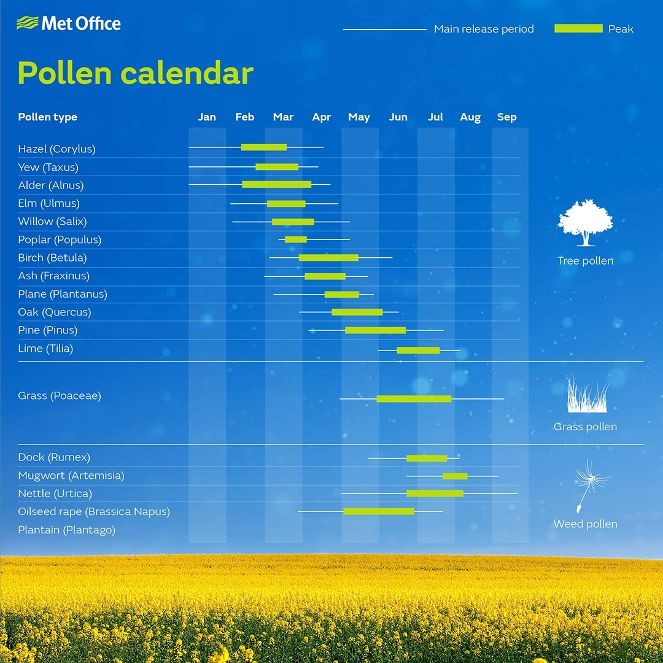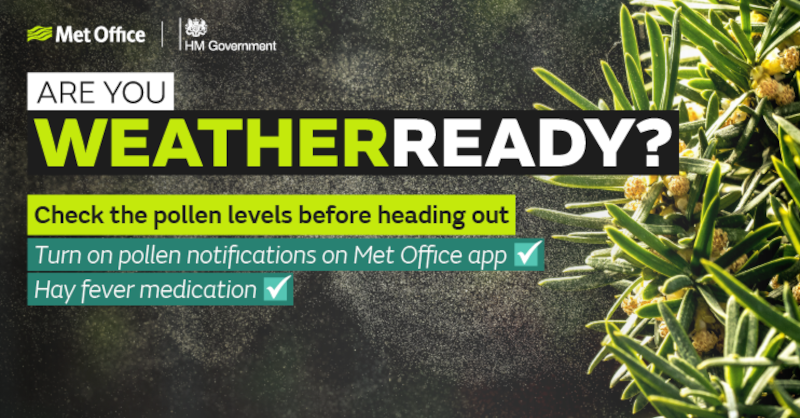Met Office
|
|
A change in the pollen season – but is it worse than normal?
The effects of hay fever are already increasingly being felt across the UK, with grass pollen now fully in focus following the spring release of many types of tree pollen.
The pollen forecast is high or very high for many areas of England and Wales over the next week, with different species of grass now releasing pollen into the air, which will continue to impact the one in five people who suffer from hay fever in the UK.

The ‘typical’ pollen season
Speaking to the Weather Snap podcast, Met Office Relationship Manager for Health and Air Quality Yolanda Clewlow said: “The grass pollen season usually follows quite a consistent pattern and there tends to be two peaks, one in the first half of June and then another one in early July. That’s because we have about 150 different species of grass and they all flower at different times over spring and summer, although only some of them are allergenic.”
2022 pollen outlook
Although many species of tree have already passed their peak pollen release phase, the vast majority of hay fever sufferers have an allergy to grass pollen. With levels high or very high in many southern and central areas of the UK in the coming week, many are wondering if it’s worse than normal this year, and the answer isn’t as straightforward as you might think.
Yolanda said: “In terms of the numbers of pollen grains in the air, what we’re seeing isn’t especially noteworthy compared to what we’ve had in previous years. However, the potency of these pollen grains could be more intense this year, and that comes down to the weather we’ve had in spring.
“A warm and wet May, coupled with a relatively warm spring, means there’s a chance that the pollen that has developed is particularly potent, even if the amounts aren’t dramatically different.”
According to Met Office provisional statistics, May 2022 was the fifth warmest on record, with slightly above average rainfall for the UK. That, coupled with a warm spring overall, has meant good growing conditions for some species of grass.
Advice
Advice on dealing with Hayfever is available as part of WeatherReady with the Met Office. According to Yolanda, one of the best defences is to keep an eye on the pollen forecast.
“The best defence against symptoms is to avoid the stimulus,” said Yolanda.
“Avoiding the pollen that you have an allergy to can really help and the levels of pollen in the air can fluctuate dramatically through the day. What’s typical is that a gentle breeze will lift the pollen off the plants early in the morning, the warm air will then carry this up and it’ll be optimal for getting into our lungs in mid-to-late morning. Interestingly, by the very middle of the day the pollen will often be carried up very high in the atmosphere, which can make the pollen count much lower near the ground. And then you can get that extra burst of pollen again in the evening as the air cools and allows the pollen to settle.”

Are you WeatherReady? Check pollen levels before heading out.
Super pollen? Not so much…
In recent days, the media has been reporting on ‘super pollen’ associated with thundery conditions. Yolanda says that although the term has no scientific basis, there is ongoing research in this area.
She said: “We have a few phrases pop up in the media like ‘super pollen’, ‘pollen bomb’ and ‘thunder fever’, but these aren’t scientific terms and not recognised as a meteorological phenomenon. What is being looked at is something called thunderstorm asthma, which isn’t well understood globally, but it’s looking at how, in very specific conditions, there’s a chance that thunder and lightning can increase the symptoms of those with hay fever. Whether that’s down to airflows or lightning splitting pollen grains open, it’s too early to say, but it’s something that is in active research with our health partners.”
Hear more from Yolanda on the Weather Snap podcast with Clare Nasir.
Find more pollen advice as part of WeatherReady with the Met Office.
Original article link: https://blog.metoffice.gov.uk/2022/06/10/a-change-in-the-pollen-season-but-is-it-worse-than-normal/


